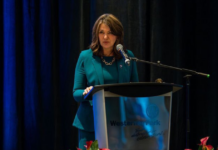Alberta Premier Danielle Smith said she won’t be implementing a policy on transgender use of change rooms and whether transwomen should be admitted into women’s prisons during a discussion with True North’s Andrew Lawton at the Canada Strong and Free Network conference.
Smith said that she’s been consulting with transgender individuals since the moment she entered politics and as recently as Thursday, some transgender individuals travelled to a conference and offered their advice to her on the province’s policies.
While recently speaking with a transgender individual yet to transition below the waist, Smith learned that the person enjoys spa days with her girlfriends and expressed concerns about being in a separate locker room, which she felt would worsen her experience.
“I think the issue is modesty. If you have not fully transitioned, then you shouldn’t be exposing yourself in female-only spaces because no one should know. You should either be behind in a washroom stall or you should show modesty and then it doesn’t become an issue,” said Smith.
She added that it is essential for women to feel safe in private spaces when they feel most vulnerable.
“I’ve not seen anything in Alberta that leads me to believe I have to do anything about that, so I’m not going in that direction,” said Smith.
She said that she has been keeping a close eye on what’s happening internationally and nationwide with issues arising with transgender individuals using changerooms. She had been doing the same for transgender individuals who are imprisoned.
“In our own province, I haven’t seen anything that rises to it. Remember, in provincial jails, I think it’s two years less than a day that you serve. So, I have not observed any emergence of problems that might happen that I’m seeing elsewhere,” Smith concluded.
However, the premier still stands by the policies she introduced on the issue earlier this year.
Smith reiterated her previous claims of following international evidence and science, citing the recently released Cass Review, which Smith claimed was “the most comprehensive review of the medical literature and the science behind this.”
“What she discovered, quite frankly, is there isn’t very good science. Notwithstanding what the left likes to tell us, there isn’t good long-term data about how many kids go on puberty blockers and whether it impacts fertility and at what age. There isn’t long-term information about what happens to those kids by the time they reach 25,” she added.
The Cass Review criticized the field’s research, noting “systematic evidence reviews demonstrated the poor quality of the published studies.”
The review added that evidence based on the care of children and young people and its strengths and weaknesses is “often misrepresented and overstated, both in scientific publications and social debate.”
The research shows that long-term data on minors who took puberty blockers was insufficient, offering scant details on future outcomes.
“We’re not going to assign puberty blockers as a matter of course,” said Smith.
As previously reported by True North, Smith banned top and bottom gender reassignment surgeries for children under the age of 17 in Alberta. She also prohibited puberty blockers and hormone therapies for minors aged 15 and under. For those aged 16 and 17, explicit approval is required from parents, physicians, and psychologists, on top of the minor being deemed mature enough to make the decision.
Parental notification and consent were also made mandatory for any child aged 15 and under to change their name or pronouns in school, with notification required for those aged 16 and 17.
“You cannot be out to your entire school community, and the only people who aren’t allowed to know are your parents,” said Smith.
Despite not seeing any issues in her province with transgender individuals using change rooms or prisons, Smith did raise some concerns she’s observed provincially.
Doctors in Alberta don’t perform any operative surgeries on individuals who decide to transition. Instead, patients fly to Quebec to receive treatment and then return home. Smith’s focus has been to improve post-operative care because many complications generally accompany the surgeries.
“Those who have decided to transition need lifelong support for hormone treatment and also lifelong support for the consequences that might happen of doing that transition,” said Smith.
While Smith has been trying to support the transgender community, not all agree with her direction.The Canadian Medical Association issued a news release in March, signed by thirteen doctors, saying that “medical associations across the country oppose government efforts to restrict access to care.”





















